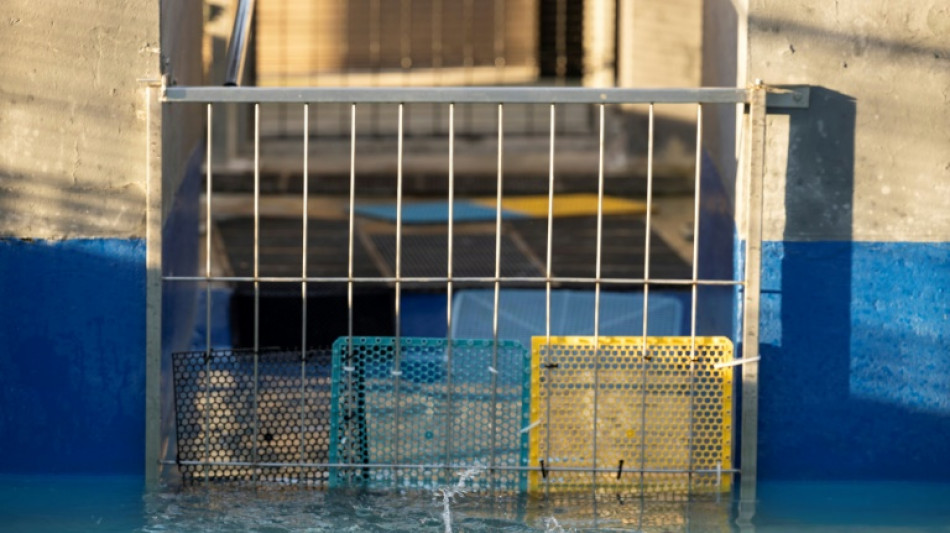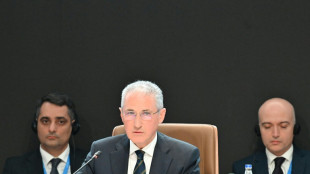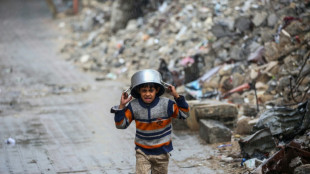
-
 4 security forces killed as ex-PM Khan supporters flood Pakistan capital
4 security forces killed as ex-PM Khan supporters flood Pakistan capital
-
Four bodies, four survivors recovered from Egypt Red Sea sinking: governor

-
 Ayub century helps Pakistan crush Zimbabwe, level series
Ayub century helps Pakistan crush Zimbabwe, level series
-
French court cracks down on Corsican language use in local assembly

-
 Russia expels UK diplomat accused of espionage
Russia expels UK diplomat accused of espionage
-
Israeli security cabinet to discuss ceasefire as US says deal 'close'

-
 COP29 president blames rich countries for 'imperfect' deal
COP29 president blames rich countries for 'imperfect' deal
-
No regrets: Merkel looks back at refugee crisis, Russia ties

-
 IPL history-maker, 13, who 'came on Earth to play cricket'
IPL history-maker, 13, who 'came on Earth to play cricket'
-
Prosecutors seek up to 12-year terms for French rape trial defendants

-
 Laos hostel staff detained after backpackers' deaths
Laos hostel staff detained after backpackers' deaths
-
Hong Kong LGBTQ advocate wins posthumous legal victory

-
 Rod Stewart to play Glastonbury legends slot
Rod Stewart to play Glastonbury legends slot
-
Winter rains pile misery on war-torn Gaza's displaced

-
 'Taiwan also has baseball': jubilant fans celebrate historic win
'Taiwan also has baseball': jubilant fans celebrate historic win
-
Russia pummels Ukraine with 'record' drone barrage

-
 Paul Pogba blackmail trial set to open in Paris
Paul Pogba blackmail trial set to open in Paris
-
Landmine victims gather to protest US decision to supply Ukraine

-
 Indian rival royal factions clash outside palace
Indian rival royal factions clash outside palace
-
Manga adaptation 'Drops of God' nets International Emmy Award

-
 Philippine VP denies assassination plot against Marcos
Philippine VP denies assassination plot against Marcos
-
Hong Kong's legal battles over LGBTQ rights: key dates

-
 US lawmakers warn Hong Kong becoming financial crime hub
US lawmakers warn Hong Kong becoming financial crime hub
-
Compressed natural gas vehicles gain slow momentum in Nigeria

-
 As Arctic climate warms, even Santa runs short of snow
As Arctic climate warms, even Santa runs short of snow
-
Plastic pollution talks: the key sticking points

-
 Indonesia rejects Apple's $100 million investment offer
Indonesia rejects Apple's $100 million investment offer
-
Pakistan police fire tear gas, rubber bullets at pro-Khan supporters

-
 Hong Kong same-sex couples win housing, inheritance rights
Hong Kong same-sex couples win housing, inheritance rights
-
Indonesia digs out as flooding, landslide death toll hits 20

-
 Liverpool's old guard thriving despite uncertain futures
Liverpool's old guard thriving despite uncertain futures
-
Mbappe takes reins for Real Madrid in Liverpool clash

-
 As AI gets real, slow and steady wins the race
As AI gets real, slow and steady wins the race
-
China's Huawei to launch 'milestone' smartphone with homegrown OS

-
 Porzingis and Morant make triumphant NBA returns
Porzingis and Morant make triumphant NBA returns
-
Hong Kong top court affirms housing, inheritance rights for same-sex couples

-
 Philippines, China clashes trigger money-making disinformation
Philippines, China clashes trigger money-making disinformation
-
Most Asian markets drop, dollar gains as Trump fires tariff warning

-
 England 'not quivering' ahead of New Zealand Test challenge
England 'not quivering' ahead of New Zealand Test challenge
-
Bethell to bat at three on England Test debut against New Zealand

-
 Trump vows big tariffs on Mexico, Canada and China
Trump vows big tariffs on Mexico, Canada and China
-
New Zealand and England to play for Crowe-Thorpe Trophy

-
 Scheffler, Schauffele and McIlroy up for PGA Player of the Year
Scheffler, Schauffele and McIlroy up for PGA Player of the Year
-
Trump to face less internal pushback in new term: ex-commerce chief

-
 Extreme weather threatens Canada's hydropower future
Extreme weather threatens Canada's hydropower future
-
More than 34,000 register as candidates for Mexico judges' election

-
 Australia ban cycling's Richardson for life after UK defection
Australia ban cycling's Richardson for life after UK defection
-
Internal displacement in Africa triples in 15 years: monitor

-
 'Remarkable global progress': HIV cases and deaths declining
'Remarkable global progress': HIV cases and deaths declining
-
Social media firms raise 'serious concerns' over Australian U-16 ban


S.Africa clinic hopes to save penguins' future
A small fish is dangled under the beak of an emaciated penguin at a South African clinic, to whet the bird's appetite.
The sickly animal is among dozens undergoing treatment in the coastal town of Gqeberha, where a dedicated rehabilitation centre is on a mission to bring African penguins back from the brink of extinction.
"We are trying to reverse some of the human damage caused to these birds over the years," says Caitlin van der Merwe, a seabird ranger at the Southern African Foundation for the Conservation of Coastal Birds (SANCCOB).
Threatened by climate change and human activity, the endangered species, which waddles awkwardly on land but turns into a fast-swimming torpedo in the water, has suffered a drastic decline in numbers.
Around 50,000 mating pairs -- penguins are monogamous -- inhabited the shorelines of South Africa and Namibia three decades ago. Today the number has dropped to 10,000 pairs.
That's a jaw-dropping 80 percent population decrease, which zoologists say is even more worrying given that a healthy penguin population is considered indicative of a healthy marine ecosystem.
"The species declining, that means there's a big issue in the marine environment," says Carl Havemann, who heads the penguin clinic.
- Climate threat -
The centre is currently teeming with feathered patients.
Over the past two weeks, about 40 baby penguins have been transferred here from Bird Island, an islet home to one of Africa's largest penguin colonies about 60 kilometres off Gqeberha, formerly known as Port Elizabeth.
Heavy rains have battered the island, washing away nests and chicks.
The little black and white birds traditionally dug their nests into a thick layer of guano - a mixture of droppings and remains that accumulate over time.
But the organic substance has been plundered for use as natural fertiliser, and the penguins now have to make do with branches or in cracks in the rocks, which make for a less sturdy home.
And for the first three months of their lives the birds are covered only by grey plumage that offers little protection from water and cold.
The rains caused many to drown or die of hypothermia.
"With climate change, weather events are becoming more and more extreme and these obviously impact the natural colonies," Havemann says.
- Footbath -
Some survivors are being treated in the seabird rehabilitation centre's intensive care unit, where staff are busy disinfecting, stitching and bandaging wounds.
Footbaths, sardines and medicines are also part of the treatment.
In total, around 100 birds, both young and adult, are cared for in the clinic.
The goal is to return them to the wild in the shortest time possible, limiting interaction with humans to what is strictly necessary.
The penguins huddle together, their shoulders raised as if they are perennially cold.
Some are kept hydrated through a small tube inserted in their gullets. Desperate ones are euthanised.
For those who are fit enough, rehab continues in the pool.
"If they don't swim, they don't drink," says van der Merwe, as she whispers soothing words to a small penguin furiously waving its wings while she holds it between her thighs.
It is suffering from borreliosis, an infectious disease caused by bacteria, and needs antibiotics.
Besides extreme weather events, African penguins are also threatened by diseases, overfishing and pollution.
Gqeberha is home to a major port and huge cargo ships refuel offshore.
Spills in the recent past have seen frantic attempts to rescue and clean up oil-tarred penguins.
At current rates of decline, African penguins could become extinct within a decade, according to the Environment Ministry.
"The ocean has such a complexity. If we take bits here and there, the whole system will collapse," van der Merwe says.
P.Sousa--PC


